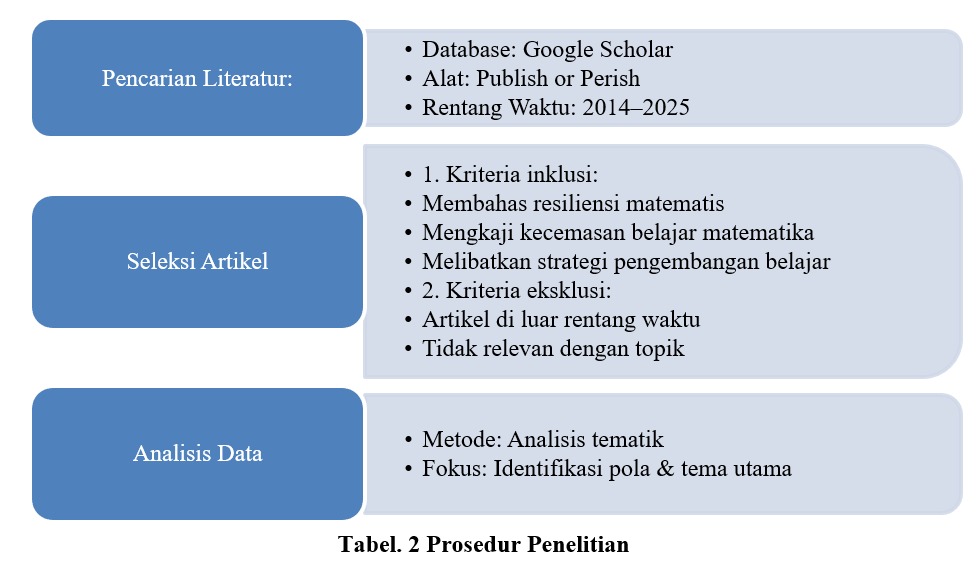Resiliensi Matematis Mahasiswa: Studi Literatur tentang Pengembangan Kemampuan Menghadapi Kecemasan Belajar Matematika
Abstract
Kecemasan belajar matematika dapat terjadi pada seluruh mahasiswa, tidak terbatas pada program studi sains atau matematika. Resiliensi matematis menjadi faktor kunci dalam membantu mahasiswa menghadapi tantangan belajar dan mengembangkan ketahanan dalam menyelesaikan permasalahan matematis. Kajian ini bertujuan untuk menganalisis strategi yang dapat digunakan untuk meningkatkan resiliensi matematis mahasiswa serta memahami faktor-faktor yang berkontribusi dalam membangun ketahanan akademik. Menggunakan metode studi literatur sistematis berbasis model SPIDER dengan mengumpulkan dan menganalisis artikel ilmiah dari Google Scholar yang diperoleh melalui Publish or Perish dalam rentang waktu 2014–2025. Artikel yang dianalisis dipilih berdasarkan relevansi dengan topik resiliensi matematis dan kecemasan belajar matematika. Hasil penelitian menunjukkan bahwa pendekatan pembelajaran berbasis pengalaman, dukungan sosial dari dosen dan rekan sebaya, serta strategi regulasi diri menjadi faktor utama dalam meningkatkan resiliensi matematis mahasiswa. Mahasiswa yang diberikan kebebasan dalam mengeksplorasi konsep matematika melalui diskusi kelompok dan proyek berbasis masalah cenderung memiliki ketahanan akademik yang lebih baik. Hasil penelitian ini berimplikasi pada penyusunan rencana pembelajaran yang menggunakan metode pembelajaran dengan menekankan eksplorasi konsep dan pemecahan masalah secara kolaboratif. Studi lebih lanjut diperlukan untuk menguji efektivitas strategi ini dalam lingkungan akademik yang lebih luas dan mengembangkan instrumen evaluasi yang lebih terstandarisasi.Downloads
References
Apostolidu, M., & Johnston-Wilder, S. (2023). Breaking through the fear: Exploring the mathematical resilience toolkit with anxious FE students. Research in Post-Compulsory Education, 28(2), 330–347. Scopus. https://doi.org/10.1080/13596748.2023.2206704
Buckley, S., & Sullivan, P. (2023). Reframing anxiety and uncertainty in the mathematics classroom. Mathematics Education Research Journal, 35, 157–170. Scopus. https://doi.org/10.1007/s13394-021-00393-8
Cheung, K.-C. (2017). The effects of resilience in learning variables on mathematical literacy performance: A study of learning characteristics of the academic resilient and advantaged low achievers in Shanghai, Singapore, Hong Kong, Taiwan and Korea. Educational Psychology, 37(8), 965–982. Scopus. https://doi.org/10.1080/01443410.2016.1194372
Chinn, S., & Ashcroft, R. E. (2016). Mathematics for Dyslexics and Dyscalculics: A Teaching Handbook: Fourth Edition. Dalam Math. For Dyslexics and Dyscalculics: A Teach. Handb.: Fourth Ed. (hlm. 346). Wiley Blackwell. Scopus. https://doi.org/10.1002/9781119159995
Faraji, J., & Metz, G. A. S. (2021). Aging, social distancing, and COVID-19 risk: Who is more vulnerable and why? Aging and Disease, 12(7), 1624–1643. Scopus. https://doi.org/10.14336/AD.2021.0319
Hornigold, J. (2023). ALL ABOUT DYSCALCULIA: A PRACTICAL GUIDE FOR PRIMARY TEACHERS. Dalam All About Dyscalculia: A Practical Guide for Prim. Teachers (hlm. 132). Taylor and Francis. Scopus. https://doi.org/10.4324/9781003326625
Hunt, T. E., & Maloney, E. A. (2022). Appraisals of previous math experiences play an important role in math anxiety. Annals of the New York Academy of Sciences, 1515(1), 143–154. Scopus. https://doi.org/10.1111/nyas.14805
Jeong, M.-J., Lee, C., Sung, K., Jung, J. H., Pyo, J. H., & Kim, J.-H. (2020). Fear response-based prediction for stress susceptibility to PTSD-like phenotypes. Molecular Brain, 13(1). Scopus. https://doi.org/10.1186/s13041-020-00667-5
Lee, C., & Johnston-Wilder, S. (2017). The Construct of Mathematical Resilience. Dalam Underst. Emot. In Math. Think. And Learn. (hlm. 269–291). Elsevier Inc. Scopus. https://doi.org/10.1016/B978-0-12-802218-4.00010-8
Li, Q., Xiao, D., & Zeng, Q. (2024). Exploring performance of athletic individuals: Tying athletic behaviors and big-five personality traits with sports performance. PLoS ONE, 19(12). Scopus. https://doi.org/10.1371/journal.pone.0312850
Nolan, K., & Bergin, S. (2016). The role of anxiety when learning to program: A Systematic review of the literature. ACM Int. Conf. Proc. Ser., 61–70. Association for Computing Machinery. Scopus. https://doi.org/10.1145/2999541.2999557
Ozturk, C., & Kilmen, S. (2022). Middle school students’ mathematical resilience and perceptions of mathematics: A cluster analysis approach. Egitim ve Bilim, 47(209), 155–170. Scopus. https://doi.org/10.15390/EB.2022.10258
Petronzi, D., Schalkwyk, G., & Petronzi, R. (2024). A Pilot Math Anxiety Storybook Approach to Normalize Math Talk in Children and to Support Emotion Regulation. Journal of Research in Childhood Education, 38(1), 145–163. Scopus. https://doi.org/10.1080/02568543.2023.2214591
Prabawanto, S. (2019). Analysis of students’ mathematics resilience abilities on linear program material. J. Phys. Conf. Ser., 1280(4). Institute of Physics Publishing. Scopus. https://doi.org/10.1088/1742-6596/1280/4/042005
Pulungan, D. A., Retnawati, H., & Jaedun, A. (2022). Mathematical Resilience: How Students Survived in Learning Mathematics Online During the Covid-19 Pandemic. Qualitative Research in Education, 11(2), 151–179. Scopus. https://doi.org/10.17583/qre.9805
Ruqoyyah, S., Murni, S., & Fasha, L. H. (2020). Microsoft Excel VBA on mathematical resilience of primary school teacher education students. Dalam Hendriana H., Hidayat W., Widodo S.A., Irfan M., Noto M.S., Perbowo K.S., & Prahmana R.C.I. (Ed.), J. Phys. Conf. Ser. (Vol. 1657). IOP Publishing Ltd. Scopus. https://doi.org/10.1088/1742-6596/1657/1/012010
Samuel, T. S., Buttet, S., & Warner, J. (2023). “I Can Math, Too!”: Reducing Math Anxiety in STEM-Related Courses Using a Combined Mindfulness and Growth Mindset Approach (MAGMA) in the Classroom. Community College Journal of Research and Practice, 47(10), 613–626. Scopus. https://doi.org/10.1080/10668926.2022.2050843
Valieva, F., & Ivanova, E. (2020). The Student’s Anxiety and Resilience Research in the Context of the Transition to Distance Learning. ACM Int. Conf. Proc. Ser. Dipresentasikan pada ACM International Conference Proceeding Series. Association for Computing Machinery. Scopus. https://doi.org/10.1145/3446434.3446546





















.png)
